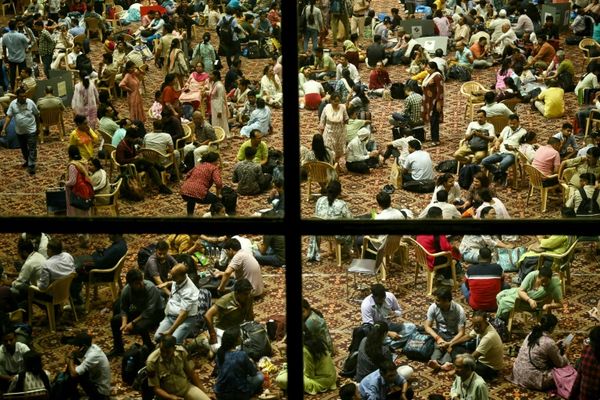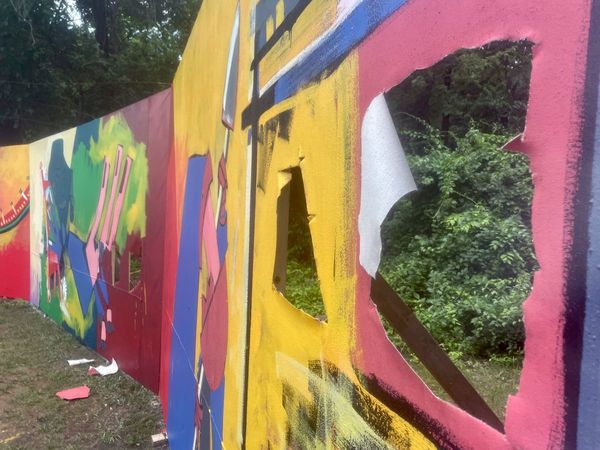
When Mabe Fratti turned 18, she decided she wanted to celebrate by climbing a volcano in her native Guatemala. “I had climbed a couple of small ones and I wanted to climb a slightly bigger one,” says Fratti, now 31. On the ascent, she and her friends got robbed. “We were so alone, it’s such a juicy situation!” Since then, she realised, “maybe I’m not so much of a hiker. I just like to play in fields or go into the forest.”
The revelation foreshadowed a similar shift in Fratti’s approach to playing the cello. Even as a teenager borrowing a communal instrument covered in stickers to indicate the correct finger placings, she had bristled against the academy and craved an experimental approach. Still, her aim was to create an era-defining masterpiece. But now, she says, “instead of trying to find the beautiful and amazing piece that is meant for history to keep, or whatever, I changed my mind into more of a discovery path. What would happen if I would like to make something groovy? Or an album with only cello automatised with voice? A very distorted cello album with vocals that are super heavy? This is the kind of thing that I want to discover more.”
Fratti’s wild creativity has made her into a fervently acclaimed new voice in experimental music. Across three solo electro-acoustic albums, she seems to have zoomed closer and closer in to her instrument: 2020’s Pies Sobre la Tierra was bodily and resonant, 2021’s Será Que Ahora Podremos Entendernos sinewy and twitching; last year’s unsettling Se Ve Desde Aquí amplified the hairs of her bow fraying against the strings (Oneohtrix Point Never called it “mind-blowing”). All refine Fratti’s deconstructed, beautifully uneasy song craft, threaded together by her sage, Spanish-language vocals. “Her shifts from composed material to improvisation feel really special and never forced,” says US drummer Chris Corsano, a renowned collaborator with the likes of Björk, Bill Orcutt and Kim Gordon, who has been playing with Fratti recently. “To me, her music is a continual opening of possibilities – with the ability to go in any and all directions at once.”
These qualities have made the adventurous cellist a fertile collaborator, with two new projects released in recent weeks. Last month, she and her partner Hector Tosta (AKA I la Católica) released the album Vidrio under the name Titanic, an ecstatic yet fraught chamber-pop cabaret reminiscent of Julia Holter and Meredith Monk. Soon after, came the dreamy but distorted A Time to Love, a Time to Die by Amor Muere, an improv quartet she joined in her adopted home of Mexico City.
Crucially to collaboration, Fratti also seems like a great hang: unguarded and exuberant, all long tangled hair and armloads of tattoos. Over 90 minutes on Zoom, she careens her phone around the spartan home she shares with Tosta, darting into the kitchen where he’s making tacos to ask for his thoughts: “Pescado!” she calls (when he shuts his eyes, she says lovingly, he looks like a fish). Both her new projects were enriching trust falls of different kinds. The music for Vidrio was all composed by Tosta, whereas Amor Muere, comprising Fratti, Camille Mandoki, Gibrana Cervantes and Concepción Huerta, is a democratic outfit. “Amor Muere starts from like a playground setting,” she says. “It helps me to mould and listen a lot and accept other people’s creativity. With Titanic, Hector studied composition so he’s way more structured. If you study composition, you imagine the future in a more concrete way.”

Both records led Fratti to question herself: Vidrio was recorded in a studio, and it was a challenge to convey how she wanted her voice or cello to sound to the engineer: “I cannot put my thought in your head!” she says. Poring over takes with Amor Muere, meanwhile, she got “too much into my own head”, she says. “It was also letting go and trusting the judgment of these people that I really trust already. I think I was redundant!” Working alone, she feels “super free … but in other cases, I would really doubt my own perspective.” But that doubt isn’t a negative, says Fratti. “It’s exciting.”
Fratti’s creative life has been an exercise in breaking down rigidity. Growing up in Guatemala in the 2000s, she was surrounded by walled neighbourhoods designed to protect against the threat of gangs and gun crime, but was determined not to absorb the prevailing feeling of insecurity: “I’m not so happy about giving my mother some nightmares, but I definitely wanted to go out and know other people that were involved in music and start bands.” Despite the “nonexistent” music industry infrastructure in Guatemala, one Fratti says is largely propped up by money from beer companies, she didn’t want for gateways to experimental music. The contemporary music ensemble she joined explored unusual techniques beyond those she learned at school; driving with friends was another fount of inspiration, as was a metalhead bassist in an early band who introduced her to Sunn O))), Scott Walker and Cocteau Twins. The cello she still plays today was her gift for graduating high school: “It has a good sound, or maybe I got used to the sound because it broke when I got it.”
She studied journalism as a plan B but quit before her final year to move to Antigua Guatemala, a city that presented its own problems. “When it’s touristic, it creates this cycling of aesthetics where it has to look how the picture is, so you cannot move forward,” says Fratti. In 2015, the Goethe-Institut invited her to participate in a residency in Mexico City. Only her second time playing music outside of Guatemala, it was “paradigm-shifting” and suggested her next steps. Performing with established musicians such as German techno legend Gudrun Gut and Mexican noise artist Julian Bonequi felt intimidating at first, “but all these people were very welcoming”, says Fratti. Bonequi introduced her to the music of Korean cellist Okkyung Lee, “and I went crazy!” It spurred him to invite her to some local improv shows. “I was very amazed by the community,” she says. “When I left Guatemala we didn’t have that free improv scene so I was super attracted to that movement.” A year later, she moved to Mexico City permanently. It started a domino effect of meeting musicians, seeing shows and becoming “super connected to the city because I was like, this is destiny!”
Fratti’s musicianship flourished. After seeing a show by drummer Gibrán Androide, she asked him to help her develop her improvisation skills as a way of responding to her environment, and noticed the “chaos” of the city coming out in her music. The British indie label Tin Angel offered to release her records, and with her feet on steady ground as part of a thriving music community – partly orbiting the venue Jazzorca, run by the brilliant experimental jazz musician Germán Bringas – Fratti’s music and lyrics explored uncertainty and miscommunication. The more she learns about certain topics or systems, she says, the more certain she is that she could be wrong. In the Titanic song Anónima, to dramatic flicks of cello and contained clatter, she sings: “Si no se quien puedo ser pues soy mi presentimiento” (If I don’t know who I can be, I’m going to be my hunch). Embracing instinct and ambiguity sounds like good counter to today’s polarised discourse, I suggest. Fratti takes us into the kitchen to ask Tosta, who wrote the lyrics. A few years ago, he says, they read the book The Transparency Society by Byung-Chul Han, “about having this obligation to [take positions] and to feel that you have to be this kind of person and to write it in ink. Sometimes you’re just confused and it’s about your instinct and everything is so weird that—”
“You have to go with your hunch,” says Fratti.
“Sometimes those kind of risks also appear and it sounds good,” says Tosta.
Ceding creative control to improvisation and collaboration is also a good antidote to a world of stark positions. “This is something I can see in both of these projects, this constant conversation of: this is what you want to give, this is what you want to say,” Fratti says of Titanic and Amor Muere. “It feels so nice. It feels like a conscious but also meaningful intention to make the voices of the collaboration be as respected as the other ones, trying not to have this hierarchy and trying to understand that there’s many approaches to music.”
Fratti is the highest-profile musician of a tight-knit scene: her music has taken her to residencies and festivals in Europe and even the Royal Albert Hall as the invited support act of British songwriter Ben Howard. (“She plays like there is no one in front of her and no one behind her,” says Howard. “It’s like watching a sunbeam. Her songs are a bit like planets in a way: that central thought turning and turning with these rings of shrapnel constantly chiming and morphing and circling.”) And Mexico City is changing: between 2019 and 2023 its population grew by 3% and the number of Americans applying for or renewing residency visas leapt 70%. Rents have risen dramtically and a branch of Soho House just opened. Fratti feels conflicted about commenting on the situation as an outsider, but says: “I really try to belong. My friend lives very close to Soho House and she says, whenever she opens the window of her house, she only hears people talking in English, so it becomes maybe a more isolated community. Not wanting to be part of the whole.”
The wider attention on her and the city hasn’t changed anything in her scene, says Fratti. “The community here is super chill and there’s a feeling of collaboration all the time, of doing things together. It just happens naturally.” Tosta has produced her next record: “A groovy thing that makes me think a little bit about progressive music, but not really progressive like Yes or Camel,” she clarifies, laughing. “You’re surprised structurally.” She already has ideas for its followup, a stripped-back record of voice, cello and resonators, or maybe the distorted, heavy record she mentioned earlier. The fields are limitless.







